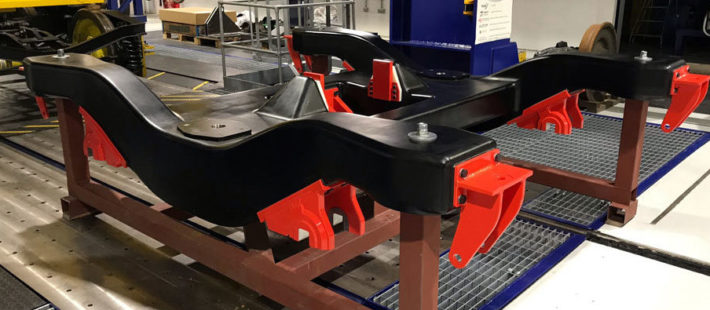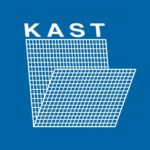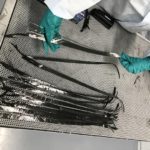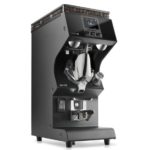World’s first carbon fibre rail bogie unveiled at ‘Unlocking Innovation’ rail conference at the University of Huddersfield
The world’s first carbon fibre bogie (CAFIBO) was unveiled the 10th of December. It was developed by British company ELG Carbon Fibre in collaboration with the University of Huddersfield’s Institute for Railway Research. The bogie, which is made entirely out of surplus and recycled carbon fibre materials, was presented to over 100 industry delegates at the Railway Industry Association’s (RIA) Unlocking Innovation event at the University of Huddersfield.
The new CAFIBO bogie is lighter than conventional bogies and optimises vertical and transverse stiffness. This new type of bogie will:
- reduce track wear and infrastructure maintenance costs by reducing vertical and transverse loads on the rails
- improve reliability and operational availability through an embedded health monitoring system
- reduce energy consumption and hence global warming footprint.
The rail bogie is being developed as part of a two-year programme delivered by a consortium of companies comprising of ELG Carbon Fibre, Magma Structures, the University of Birmingham and the University of Huddersfield with additional support from Alstom. Over the next few months, the bogie will be tested on the University of Huddersfield’s state-of-the-art test rolling rig named the Huddersfield Adhesion & Rolling contact Laboratory Dynamics rig, or ‘HAROLD’.
Frazer Barnes, Managing Director of ELG Carbon Fibre commented, “Replacing steel with recycled carbon fibre to produce a rail bogie is a world first so it is a hugely exciting and rewarding project to be part of. We hope to make recycled carbon not only an attractive option for the rail industry in terms of weight reduction but also to eliminate waste and drive down cost.”
Simon Iwnicki, Director of the Institute of Railway Research at the University of Huddersfield, said, “There are significant potential benefits from adopting novel materials and construction methods in railway vehicle bogies. The reduction in mass results in energy savings but can also reduce track forces and improve dynamic performance. I hope that the tests on the CAFIBO bogie being carried out here at Huddersfield will help to encourage the railway industry to accept these new techniques.”
Source: ELG Carbon Fibre Ltd












